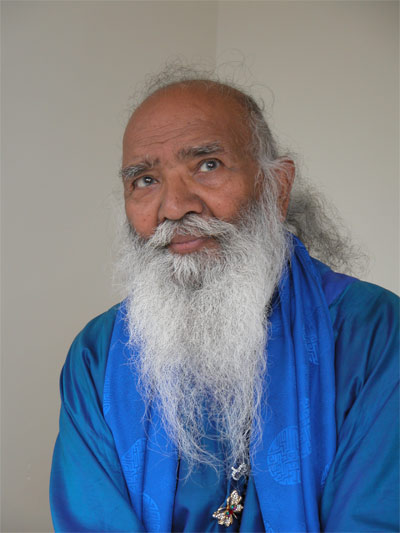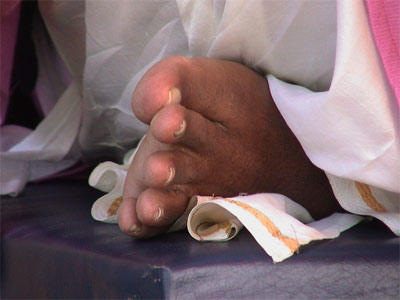Identification Should Not Be Treated as a Mistake

Devdatt: When my mind is easy, I can think I’m one with the Self because my mind is happy. And then I go through a period of identification, where I become uneasy. At that point I feel I can either run away to my room, or meditate, or wait for the uneasiness to pass. Or I can get angry and say I’m not going to get affected…or I can just accept this uneasiness and carry on. Or, is there a fourth, or a fifth or a sixth answer to this problem of identification?
Swamiji: The question is very right, because it belongs not only to one person, but pertains to humanity as a whole. Identification starts from the very birth. Whether or not a child knows that he is, or what he is, where he is, or who he is, yet he knows that hunger is there, and that is his identification. In the womb of his mother he was not dependent on his hunger. I do not know much about what happens in the womb, but certainly I know he gets some food. But who gives him food? Not he himself…yet somehow he remains alive; which means that you, as parents and people, can identify and know, with your understanding, that without food nobody survives. So from before birth, the body that is being prepared comes out, and hunger is felt by the child. That’s why, in the same way that God must be ready in the womb of a mother, the mother is ready outside, but she doesn’t know from where or how the milk is being generated from her heart and mind and body. She thinks, "I am going to give milk." She’s identified. So now, the mother is identified although she’s older, and the child is considered to be identified because as a person, he’s hungry. Therefore, this identification should not be treated as some mistake that human beings have committed—it comes by birth, it is inborn.
Now, someone may have a pain in his toe, and he is identified with the pain, but in the sleep state he does not feel that pain. In the waking state a human being has the intelligence or brainpower to understand that this body is the same in the waking state as in deep sleep, but it doesn’t feel pain in deep sleep; which means it is not identified with the pain. This means that the one who identifies with the pain is not the same person who is in the deep-sleep state. Unless you become the same person who is in deep sleep, you cannot save yourself, in the waking state, from identification. …
So, identification is a human being. When he says, "I am this body," this sentence is representative of the entire bulk of his identification. With words, he says, "identification," but he actually means, "Here I am. I take the seat, I sit down, and I ask the question." So even without speaking a word, you are identified. Why? Because you are a human being—you are born like that. We never identify with horses. They don’t sit like this! … So, human beings, as machines or as bodies are made like that—they identify. In this way, identification is not the mistake of a human being; even though everybody says you are a born sinner, you are born small, you are born ignorant, you are born as a child, which is the best word they can use for identification—you are born as a sweet child. But they are insulting you, meaning that you are born ignorant, although they don’t say this. They say you are born as a child and you should come on and learn things…see how identification is being piled up, piled up…Ima, Aba, Oma [referring to Manu, the one-year-old son of Tali and Dunn from Israel, and the Hebrew words he is learning]. So then he has to learn everything: walking, handling things, giving a flower, looking at Swamiji…apple, this, that—everything is identification. You call it knowledge. Right? So this knowledge of the things and forms comes, first insentient, and then sentient.
Mommy has got him in her lap and he’s riding over there, and he gets attached because the highest sense of joy is the sense of touch. So when she handles him and puts him in her lap, he enjoys it. He does not know what it is, but he identifies with the joy of the sense of touch, with which he is born. All the senses are like that. So every child gets attached to his Mom, but not so much to others, because Mom handles him most often. Then, slowly and slowly he gets attached to Aba, to Oma and to Uncle, because they are near him. But if Manu were left alone over here, he would become a different child. He would speak Sanskrit or Hindi. But he’s born in Israel…so if they don’t make him an Israeli, he will not fit in there. And if they don’t make Devdatt English, he could not live over there. …
So, all this is identification: games are identification…everywhere, every game, every thing is identification… identifying with the sense of yes, or joy and happiness—identification—and with pain, suffering, death, destruction—identification. It is by birth that a human being is made identified. So how can anybody on earth change a human being? That task Guru takes in his hands, thinking somebody will be eager to unfold de-identification, but there are not many. All are eager to unfold another identification, one more identification. They call it upaadhi, or degree: one M.A. degree, then a Ph.D. degree, then a D.Litt. degree, then a doctor’s degree, a professor’s degree—all kinds of things, which are all not there, yet they want to call it real, identified. …Then mine and thine comes. Now comes the question: how to be ever free from identification? Do you need to hear about it?
Listeners: Yes!

Swamiji: Yes. You start from the gross world. Whatever you are, you call it you, yourself, a body. But you walk on earth, so you are not earth—you do not identify yourself as the earth. You are not attached to the earth. I’ll not quote many examples and waste your time. I’ll come to the point: if you are not the earth, then are you your nails? You don’t identify with your nails that much, so you are not that. Then, I’ll say I am not the earth, I’m not identified with the earth. I’m not the nails, I’m not identified with the nails. Now, I’m toes—and I don’t want to change, because I feel that if I say I am not the toes, somebody will steal them! Maybe he will put them in his Guru Pooja room. [laughter] But still, I am not that. The one who is getting de-identified will start expanding, or purifying his intellect. He used to say, "I’m walking on earth, therefore, I must be earth." But now he somehow managed to examine this, and the result is that he knows he is not earth, so he’ll say, "I am not earth." Then he will say, "I am not my nails." Soon he will say, "I’m not my hair." Slowly and slowly, if his finger is cut, he’ll say, "I’m not my finger." And that baba had come [a wandering religious man] and his arm was cut, so he’ll say, "I’m not that arm." His leg was cut, or was not there, and then he’ll say, "I’m not the leg." So your knowledge is expanding, which means de-identification, detachment is coming. …
Now, a man will still say, "I am attached to my name." And if anybody calls your body by name, if I say, "Manu, come on, Manu, come on," then he comes. If I say, "stand up, stand up," he stands up. I’m not speaking to his I, I’m saying, "stand up" to the body, so I am perpetuating his identification on the level of his body. And then the body changes, so identification is changing. Yet, it is identification, so it is still ok, whether the body is bigger, or older, or not. Now I’ll say, I am not toes, I am not hair, I am not legs, I am not hands. But then I’ll see a scene, and I’ll not like to be blind, so I’ll say, "I’m my eyes." This is very important. So I became eyes, then ears—I’m ears. Then, I’ll eat—I’m teeth, tongue and all that. When my teeth are out, then I’m my denture. And I’ll identify with this denture—it’s my denture, and it will actually fit only in my mouth. Out of seven billion people, it’s not going to fit anyone else! So my body fits only in me and nowhere else. …If this continues expanding, then you come to know, "I am not my nose, I am not my tongue, I am not my throat, I am not my ribs, I am not my stomach." It’s an expansion.
When I’m not this, then I am not age or time—the clock is the time… then I’m not space. I’m not time, I’m not space, I’m not heart, I’m not mind. Then, I’m not thoughts, because thoughts change and they come and go, so I’m not thoughts. Then what am I? You’ll say, "Well, senses I am, because without the senses my world is nothing, it’s meaningless." And then you will know that without the mind, all the senses are meaningless, they are of no use. And without the intellect the mind is nothing, it’s useless, because it is the intellect that decides that I have a mind, or I make a mind. So wherever the intellect decides, you go to—to Manali, or you go to Patlikuhl—and the mind goes, along with the body. Without the intellect, the mind is of no use, no essence, it is not useful. And without the ego, I, the intellect is not of any use. Keep watching. And now you’ll say, "I, the ahankaar is useful, all the rest are not useful," but the ahankaar is also not useful in a dead man. Therefore, the soul, the spirit, the Knower, the knowing aspect in man is real, and the ahankaar is not useful; it is of no saar, no essence, not of any use.
So the jeev is an individual being, but this individual cannot be individual in the deep sleep state. An individual will be there only when consciousness arises or awakes in the waking state, so:
"I am that consciousness that arises. Then I am vaasana, [a conscious wave of thought] and that arises and immediately starts on the trip of making two, three, four, five, twenty, thirty, hundreds, thousands, millions, and the whole world. And that cannot happen in a dead man, therefore, I am also not that consciousness. Consciousness is awakened because of Me, because of the Self. So I’ve come to know that Self alone is, and Self has no scenes, no duality. Self is one without a second, advait, indivisible; Self is only aanand, indivisible. Now, I am that Self. If I identify that I am That, then there will be no wrong identification of any kind, happy or unhappy."
Then you are free. Thank you very much.
August 9, 2004
Copyright © 1999-2005 International
Meditation Institute. All Rights Reserved